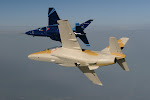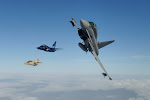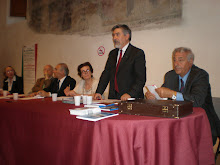di
Federico Salvati
(federicoslvt@gmail.com)
"What is peace?" Asked Susan
Sontag in her 2001 Jerusalem Prize acceptance speech. Even if it could seem a
plenitude, to outline a concrete definitions of this concept might turn out to
be quite difficult. Along with common sense, war and peace are dichotomized
concepts, antonyms constructed on the absence of a contentious situation. If we
linger upon this for more than a moment we can easily understand how this
definition is poor and unsatisfactory. The mere absence of war can't at all be
classified as peace. Let us think about the current situation of
frozen-conflicts scattered around the world ( for instance the Koreas scenario
or the Nagorno-Karabakh war). Even though there is no open fight, we can not
define light-heartedly these situations as peaceful ones. A range of feminist
authors indeed formalize peace as the “elimination of insecurity and danger”.
Bluntly put: a more realistic definition of peace has to be centered on a
positive and pro-active relation either within or between social groups. On the
other hand, absence of violent conflict (the so called “negative peace”) does
not prelude to a peaceful situation per se. such formalization of peace has a
strong explanatory power but it mystifies more than it can clear them out. The
natural fallow up to this stage shall be: to what extent do we need a
pro-active social value in order to define a context as a peaceful situation?
And what of these values should be understood as inescapable in order to do so?
Granted there is no certain answer to such a question, but it must be noted
that this is not a fancy academic frill. Au contraire, this is the apothegm of
the international “peacemaking” activity. In other words: how do we make it
sure to avoid a potential conflict scenario and how do we prevent it from a
future development? In order to untangle this knot, I could produce in this
article a long and boring list of widely-shared common sense statements about
what is important and what is not in human social life. Instead I think it
would be more interesting to quote the well-known realist thinker Kenneth Waltz
who said: “To explain war is easier than to understand peace. If one ask what
might cause war the simple answer is 'anything'...”. Scholars always prefer to
study war rather than peace enforcement, since the first one is more easy to
detect (even if lately things have become much more complicated), to define and
to harness. According to the far famed Clausewitz's definition, war is nothing
more than a “duel on an extensive scale.... mere continuation of policy by other
means”. If we understand war as the exercise of violence in order to attain an
objective, its substantial causes could be, theoretically speaking, infinite,
since whatever human impulse can lead to the exercise of violence, whenever it
is in the faculty of the subject and its exercise shall demonstrate to be the
best way to obtain what longed. Developing the essential tenets of Clausewitz'
reflection Christopher Coker in his book: “can war be eliminated?”disavows the
nature of war as a social idea. Contrarily to what John Muller asserted, war is
no socially-constructed-activity and as such can not and will not be eliminated
only by the human self-reasoning.
According to Coker's position War is a
destructive manifestation of the deep-rooted human ethos to live part of our
life as a fight. This attitude allow us to overcome hurdles and to win
difficulties.
To refuse this nature would be a
XIX-century-totalitarian-regime style hypocrisy. I won't be very popular in
asserting that but: “violence in not always bad”.
Even if (for the sake of the debate) we
could imagine a world wherein human being has been totally “de-violentized”
this world would be a sheer nightmare. The idea of conflict latu senso is a
powerful and essential part of our moral nature. No violence would mean
complete compliance with the authority, incapacity to contest, protest, to
think out of the box, self determination and so on... war as we mean it is a
narrow outburst of something widely bigger which has more extensive implication
in our daily life. The key question at
this point is: does the externalization of a conflict have to be always
destructive? Is there a way to channel it in a more constructive existence? (in
order to have further information on this read “constructive conflicts” by
Kriesberg and Dayton)
Concluding: war and peace are tow very
complicated concept. However what has been said above is only a theoretical
proposition which HAS VERY LITTLE TO DO WITH PRACTICAL REALITY. Still we need
to discuss it in order to evolve our concept of what we have been taught or we
think we know. I know I am leaving the reader with lots of unresolved questions
but a further investigation on peace and war would require definitely more time
and space and would be pretty boring. Nonetheless I won't feel any scruples in
declaring that things get better in time. We institutionalized most of our
activities, we have the capacity to evolve, to do better and to be more aware
and empathic to our neighbor and conflicts (global scale or just back street fights)
make no exception to this.


























































Nessun commento:
Posta un commento